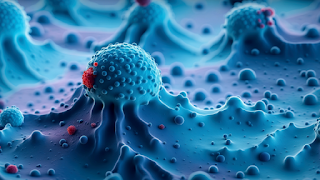Cancer treatments, such as chemotherapy, kill cancer cells by causing them to self-destruct and die, most of the time, quietly.
But, what happens to cancer cells after they die?
Normally, dead cancer cells are recycled in the same way as any other dead cell in the body.
When cancer cells die, their outer membranes become compromised. This occurs in the "quiet" form of cell death, called apoptosis, in a programmed process used to remove unnecessary or damaged cells from the body.
Once the molecular switches that trigger apoptosis are activated, the dying cell shrinks and detaches from its membrane in the form of “bubbles,” leaking internal cell components and attracting phagocytic immune cells responsible for devouring cellular debris.
Macrophages break down dead cancer cells into smaller components, such as sugars and nucleic acids, which are the chain-like molecules found in DNA. The dead cancer cells are then recycled into components that can later be reused by other cells.
Parts of cancer cells are generally recycled in this way in the case of apoptosis treatment, rather than being excreted by the body, in the urine, for example.
Sometimes, cancer treatments can lead to other types of cell death, such as necrosis, an “explosive” form of cell death, in which tumors swell and explode, and macrophages efficiently devour this type of dying cells.
But some studies suggest that the release of too much debris, which triggers inflammation, can sometimes promote the growth of cancer cells remaining nearby, which may explain how some types of cancer come back after treatment.
More recently, a study in mice and cells in laboratory dishes found that radiation and chemotherapy can trigger the release of proinflammatory cytokines, molecules released by immune cells that can sometimes support tumor growth.
Another study found that control centers, or the nuclei of dying cancer cells, can sometimes swell and explode, thus spewing DNA and other molecules into their surroundings. In mice, these molecules can accelerate metastasis, meaning cancer cells spread beyond the original tumor.
These studies help shed light on how cancer cell death contributes to cancer development and relapse.

